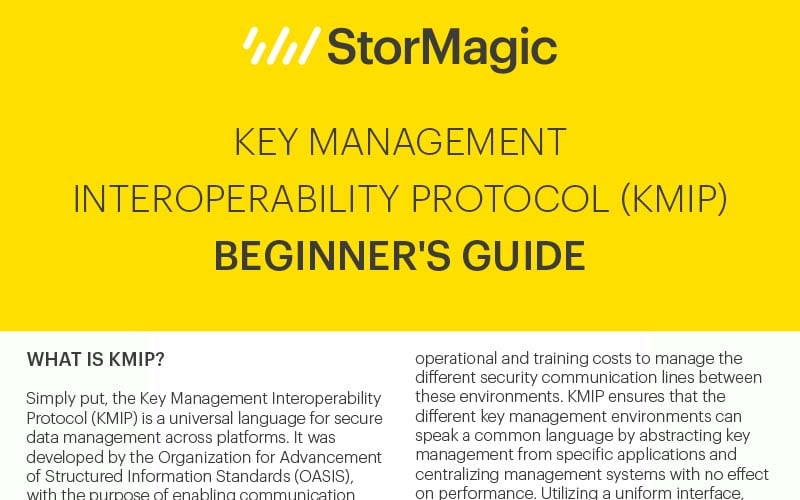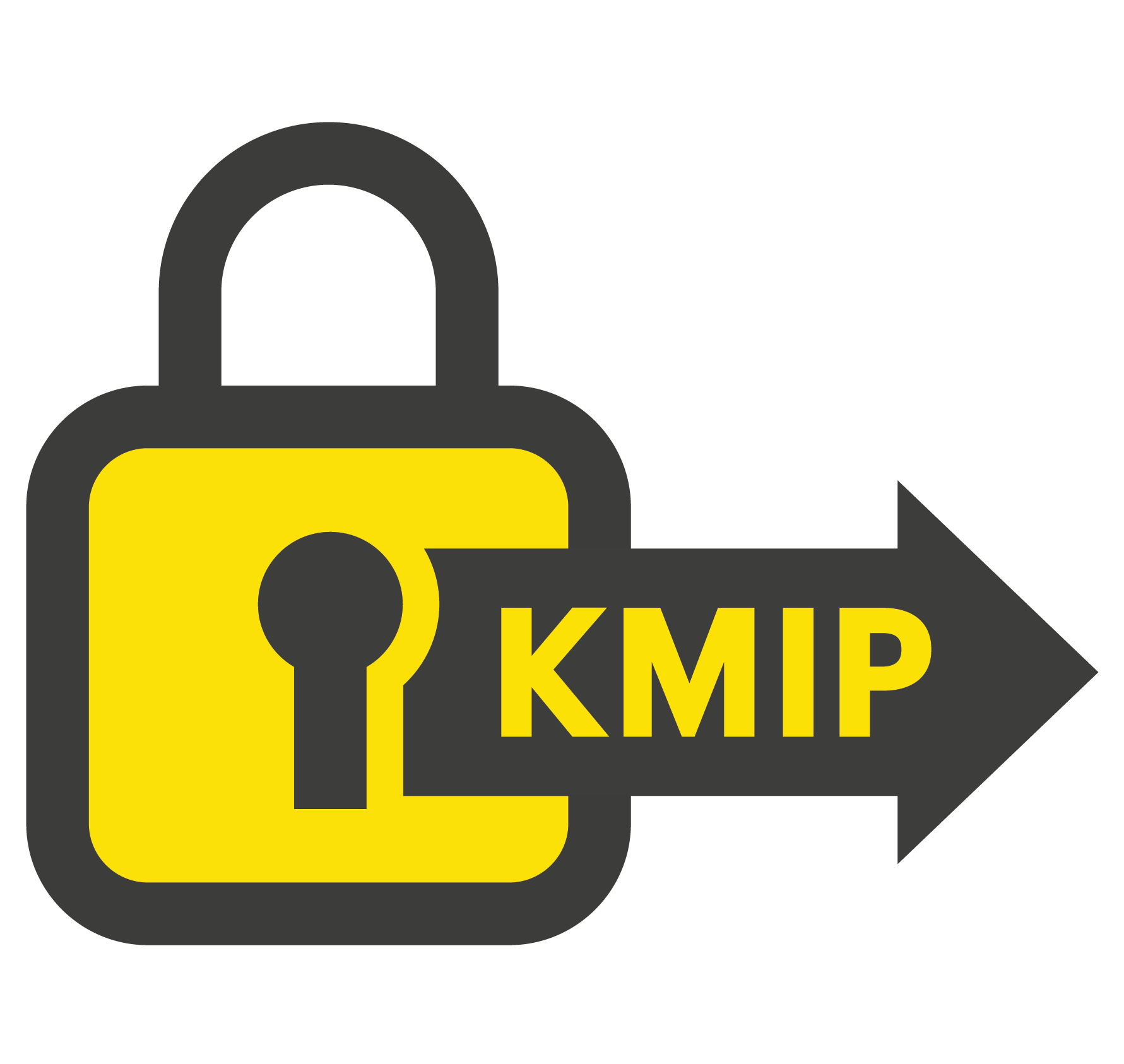What is KMIP?
Simply put, the Key Management Interoperability Protocol (KMIP) is a universal language for secure data management across platforms. It was developed by the Organization for Advancement of Structured Information Standards (OASIS), with the purpose of enabling communication between key management systems and cryptographically-enabled applications (i.e. email, storage devices, databases). It streamlines the management of encryption keys for many organizations, eliminating the need for redundant, incompatible key management processes. KMIP supports both legacy and new cryptographic-enabled applications, supporting symmetric keys, asymmetric keys, digital certificates and other shared secrets.
How Does KMIP Work?
KMIP is an open standard based method for encryption of stored data and cryptographic key management. Before KMIP, different platforms and vendors often spoke different languages, necessitating increased infrastructural, operational and training costs to manage the different security communication lines between these environments. KMIP ensures that the different key management environments can speak a common language by abstracting key management from specific applications and centralizing management systems with no effect on performance. Utilizing a uniform interface, it thus enables communication between different cryptographically-enabled applications, simplifying the management of keys, and eliminating unnecessary and incompatible processes.
Leaders in the technology sector such as IBM, Dell, HPE and Oracle have adopted KMIP, with other vendors and platforms following suit. All of this has made KMIP the de facto industry standard. But more than an industry standard, KMIP provides a more efficient and compatible tool to meet an organization’s needs. Indeed, it is central not merely to maintaining the integrity of an organization’s data, but to the integration of multiple key management systems across platforms and vendors, and to the cost efficiency of one’s technological infrastructure.

What Are the Benefits of KMIP?
KMIP standardizes communication between encryption and key management systems. Organizations that implement encryption key management solutions that support KMIP, realize the following benefits:
Simplicity
Nowadays, organizations are faced with several challenges when it comes to implementing IT security configurations. Security infrastructure quickly becomes complex and difficult to manage when there are multiple vendors and technologies involved. This holds especially true for encryption and key management, where sometimes a different key manager is required for each individual encryption application. KMIP addresses this issue by allowing a single key management system to manage keys for all the encryption systems that have adopted KMIP. This enables businesses to spend less time focusing on their IT security systems and more time on what matters — their business!
Cost-Effective
Many of today’s businesses are faced with a dilemma: how do I sufficiently secure and protect my organization’s valuable data with a limited budget? Having to implement an assortment of technologies from multiple vendors can quickly add up and become incredibly expensive. By utilizing an encryption key manager that supports KMIP, organizations are able to reduce the amount of equipment and software they require to keep their assets safe, which also reduces their costs. KMIP enables them to remove redundancies within their environment and manage all of their encryption applications through a single interface.
Flexibility
Prior to KMIP, a different proprietary KMS was required to manage each individual encryption application within an organization’s IT environment. Businesses were restricted to working with encryption vendors that were purpose-built for their specific environments and configurations. KMIP has provided organizations with the flexibility to utilize whatever key management vendor they desire. So long as an organization’s infrastructure supports KMIP, they can support integration across edge, cloud, or on-prem — all with one key manager.
KMIP and Edge Computing
Data security is incredibly important for businesses operating at the network edge. For example, retail stores, manufacturing plants, smart cities, and banking branches are all managing valuable information and would be significantly impacted by a breach. They need to have reliable data security in place to keep their data and applications safe.
Edge computing organizations are often faced with unique challenges when it comes to data security. For one, they sometimes possess many different devices or applications that need protecting, and managing proprietary systems that secure each and every one of those devices becomes complicated. Second, they are often located in remote places and / or have limited staff onsite, which can make managing and maintaining complex IT security systems difficult.
KMIP addresses both of these concerns by providing a means of connecting any encryption application with any key management system. So long as an organization’s applications support KMIP, they will be able to use them to encrypt their data and manage their encryption keys in a KMIP compliant KMS. It provides edge computing organizations with more flexibility around which key manager they implement, and simplifies the key management process by only requiring one KMS.
By implementing a single standard for managing encryption keys, edge organizations are able to reduce complexities in their environments. This makes it easier for staff to manage IT systems, makes it more affordable, and makes things simpler.
Learn more about what defines an “edge” environment, in our Beginners Guide to Edge Computing.
StorMagic SvKMS and KMIP
StorMagic SvKMS is an incredibly flexible encryption key management solution that integrates with any workflow and adapts to any environment. It simplifies complex security and key management infrastructure by providing centralized management and the ability to deploy a KMS to wherever it is needed — edge, datacenter, or cloud.
Adding to its flexibility, SvKMS has been built around maximizing the Key Management Interoperability Protocol (KMIP) open standard to enable organizations to leverage it as part of their key management operations. With SvKMS you can centrally manage, store, and consolidate encryption key management tasks across cloud, SaaS, on-premises systems, and endpoint devices like mobile and IoT. With KMIP, SvKMS can serve use cases from basic VM encryption to a complex cryptosystem.
Visit our KMIP page to learn more about leveraging it with StorMagic SvKMS and explore some of the many integrations available with SvKMS that are enabled by KMIP. You can also reach out to our sales team at [email protected] to answer any questions.


